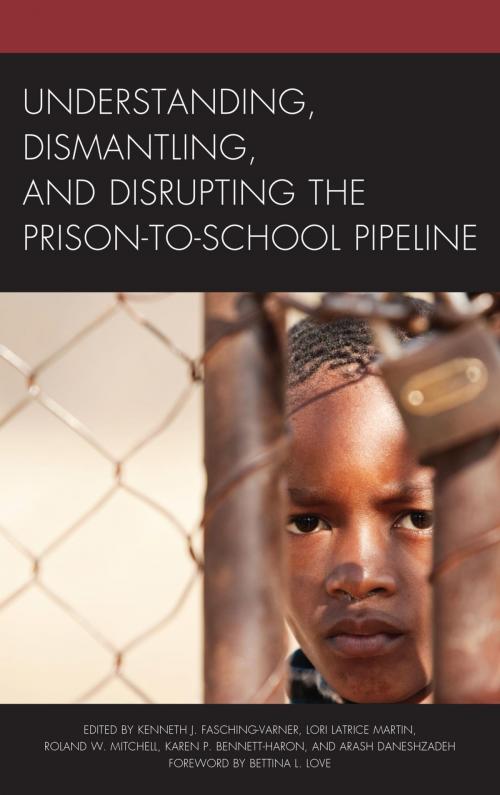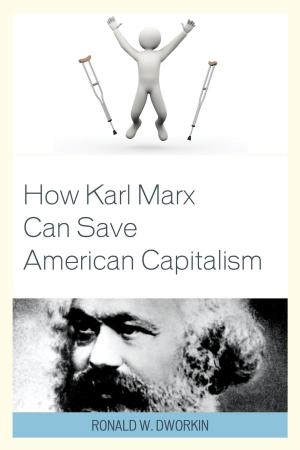Understanding, Dismantling, and Disrupting the Prison-to-School Pipeline
Nonfiction, Reference & Language, Education & Teaching, Educational Theory, Philosophy & Social Aspects, Social & Cultural Studies, Social Science, Crimes & Criminals, Criminology| Author: | Sheree N. Alexander, Mariella I. Arredondo, Tabetha Bernstein-Danis, Jill Castek, Jahaan Chandler, Christine Clark, Donna Y. Ford, Ramon B. Goings, Dari Green, Irvin Guerrero, Jim Hollar, Jesslyn Hollar, Melinda Jackson, Gloria E. Jacobs, Michael E. Jennings, Kelsey M. Jones, Runell J. King, Kerii Landry-Thomas, Brian D. Lozenski, Kasim Ortiz, Tifanie W. Pulley, Tracey M. Pyscher, Janessa Schilmoller, Michael J. Seaberry, George Sirrakos, Russell J. Skiba, Devon Wade, Tonya Walls, Gilman W. Whiting, Natasha Williams, Elizabeth Withers, Ahmad Washington | ISBN: | 9781498534956 |
| Publisher: | Lexington Books | Publication: | December 6, 2016 |
| Imprint: | Lexington Books | Language: | English |
| Author: | Sheree N. Alexander, Mariella I. Arredondo, Tabetha Bernstein-Danis, Jill Castek, Jahaan Chandler, Christine Clark, Donna Y. Ford, Ramon B. Goings, Dari Green, Irvin Guerrero, Jim Hollar, Jesslyn Hollar, Melinda Jackson, Gloria E. Jacobs, Michael E. Jennings, Kelsey M. Jones, Runell J. King, Kerii Landry-Thomas, Brian D. Lozenski, Kasim Ortiz, Tifanie W. Pulley, Tracey M. Pyscher, Janessa Schilmoller, Michael J. Seaberry, George Sirrakos, Russell J. Skiba, Devon Wade, Tonya Walls, Gilman W. Whiting, Natasha Williams, Elizabeth Withers, Ahmad Washington |
| ISBN: | 9781498534956 |
| Publisher: | Lexington Books |
| Publication: | December 6, 2016 |
| Imprint: | Lexington Books |
| Language: | English |
This volume examines the school-to-prison pipeline, a concept that has received growing attention over the past 10–15 years in the United States. The “pipeline” refers to a number of interrelated concepts and activities that most often include the criminalization of students and student behavior, the police-like state found in many schools throughout the country, and the introduction of youth into the criminal justice system at an early age. The school-to-prison pipeline negatively and disproportionally affects communities of color throughout the United States, particularly in urban areas. Given the demographic composition of public schools in the United States, the nature of student performance in schools over the past 50 years, the manifestation of school-to-prison pipeline approaches pervasive throughout the country and the world, and the growing incarceration rates for youth, this volume explores this issue from the sociological, criminological, and educational perspectives. Understanding, Dismantling, and Disrupting the Prison-to-School Pipeline has contributions from scholars and practitioners who work in the fields of sociology, counseling, criminal justice, and who are working to dismantle the pipeline. While the academic conversation has consistently called the pipeline ‘school-to-prison,’ including the framing of many chapters in this book, the economic and market forces driving the prison-industrial complex urge us to consider reframing the pipeline as one working from ‘prison-to-school.’ This volume points toward the tensions between efforts to articulate values of democratic education and schooling against practices that criminalize youth and engage students in reductionist and legalistic manners.
This volume examines the school-to-prison pipeline, a concept that has received growing attention over the past 10–15 years in the United States. The “pipeline” refers to a number of interrelated concepts and activities that most often include the criminalization of students and student behavior, the police-like state found in many schools throughout the country, and the introduction of youth into the criminal justice system at an early age. The school-to-prison pipeline negatively and disproportionally affects communities of color throughout the United States, particularly in urban areas. Given the demographic composition of public schools in the United States, the nature of student performance in schools over the past 50 years, the manifestation of school-to-prison pipeline approaches pervasive throughout the country and the world, and the growing incarceration rates for youth, this volume explores this issue from the sociological, criminological, and educational perspectives. Understanding, Dismantling, and Disrupting the Prison-to-School Pipeline has contributions from scholars and practitioners who work in the fields of sociology, counseling, criminal justice, and who are working to dismantle the pipeline. While the academic conversation has consistently called the pipeline ‘school-to-prison,’ including the framing of many chapters in this book, the economic and market forces driving the prison-industrial complex urge us to consider reframing the pipeline as one working from ‘prison-to-school.’ This volume points toward the tensions between efforts to articulate values of democratic education and schooling against practices that criminalize youth and engage students in reductionist and legalistic manners.















